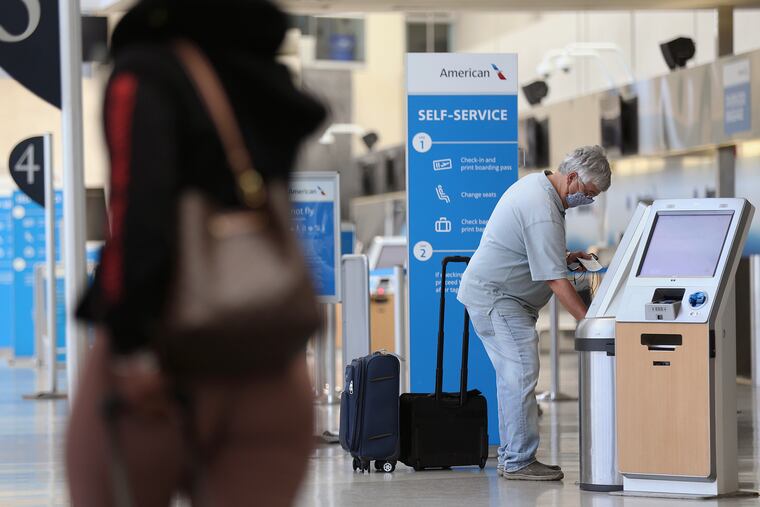Philadelphia International Airport says hundreds of layoffs are possible without more federal aid
Officials are pushing for permission from federal regulators to receive flights from Europe.

Philadelphia International Airport officials warned Friday that PHL is running out of money — and said they are still trying to win permission to receive flights from Europe.
The airport obtained $116 million in federal funding under the CARES Act to help manage the financial fallout of the coronavirus pandemic. The federal aid covered about 100 days’ worth of operating expenses and was enough to see the airport through the end of its fiscal year in June.
But without more federal funding, the city’s Division of Aviation might have to lay off “a few hundred” of its roughly 1,000 employees, chief executive Chellie Cameron said Friday.
“We have some pretty serious challenges ahead of us,” Cameron said. “Air traffic is down, and we don’t have passengers traveling, for obvious reasons. It’s safety.”
At the same time, the airport deferred rental payments owed by airlines and businesses such as shops and restaurants for three months. The landing fees that PHL collects from airlines are based on traffic, so those amounts will also drop.
“We’re very unsure of what the recovery is going to look like, and we still have ongoing expenses,” Cameron said.
PHL is asking for a new round of federal relief in conjunction with trade groups Airports Council International-North America and the American Association of Airport Executives. The groups are asking Congress for $15 billion for airport relief, $13 billion of which would be for commercial services airports like PHL, Cameron said.
Under that scenario, she said, each airport’s share of the funding would be based on its amount of passenger and cargo activity.
Without more aid, PHL expects a $23 million deficit in the current fiscal year, officials said. To make up the difference, officials will consider a combination of tapping cash reserves, suspending capital investment, laying off staff, and increasing fees charged to the airlines, they said.
The airport’s traffic numbers in April “were the worst I’ve ever seen,” down 95.5% at the low compared with the prior year, Cameron said. PHL has not yet finalized the passenger traffic figures for May and June, she said.
PHL is also seeking designation as a “funneling” airport so that it can accept transatlantic flights. There are 15 such airports in the United States that are allowed to screen returning overseas passengers for coronavirus.
“We don’t know why PHL has been left off this list,” Cameron said. A committee of Cabinet-level officials — the National Security Council’s Principal Committee — considers which airports to include on the list, and makes those recommendations to the Coronavirus Task Force, Cameron said.
“We keep making the case and are hopeful,” she said. While having the designation might not make a big difference to the airport’s finances right now, Cameron said it will matter in the months ahead: When “travel bans are lifted in their entirety ... we want to make sure that we are poised in the right place to immediately jump on that.”
Most of the airport’s international traffic typically comes from Ireland, the United Kingdom, and continental Europe, and generates $2 billion a year for the regional economy, Cameron said.
In June, U.S. Sen. Bob Casey (D., Pa.), along with Democratic U.S. Sens. Christopher Coons and Thomas Carper of Delaware, wrote to Vice President Mike Pence and the heads of several federal agencies, asking for help to reconnect Philadelphia to the European market.
“PHL is now the largest metropolitan area without approved transatlantic gateway status,” the senators said in the letter. “This places the entire region at a competitive disadvantage with other metropolitan areas along the Northeast Corridor.”
On Friday, a spokesperson for Casey’s office, Natalie Adams, said it is “past time” that the Trump administration include Philadelphia on the list of funneling airports.
A spokesperson for the U.S. Department of Transportation referred questions on Friday about PHL’s funneling status to the U.S. Department of Homeland Security, which did not immediately respond to a request for comment.
American Airlines has positioned Philadelphia in recent years as the air carrier’s gateway to Europe. The company is not operating any passenger flights to Europe out of PHL currently, but it does have plans to bring back certain routes next summer.
“American currently plans to operate 16 transatlantic flights from PHL to European destinations in summer 2021,” spokesperson Andrew Trull said Friday. “American will discontinue service to Dubrovnik, [Croatia] (DBV), Berlin (TXL), and Budapest, [Hungary] (BUD), and will not launch service to Casablanca, [Morocco] (CMN).”
This month, American notified state officials that it might have to furlough nearly 2,000 of its employees at PHL, starting in October.